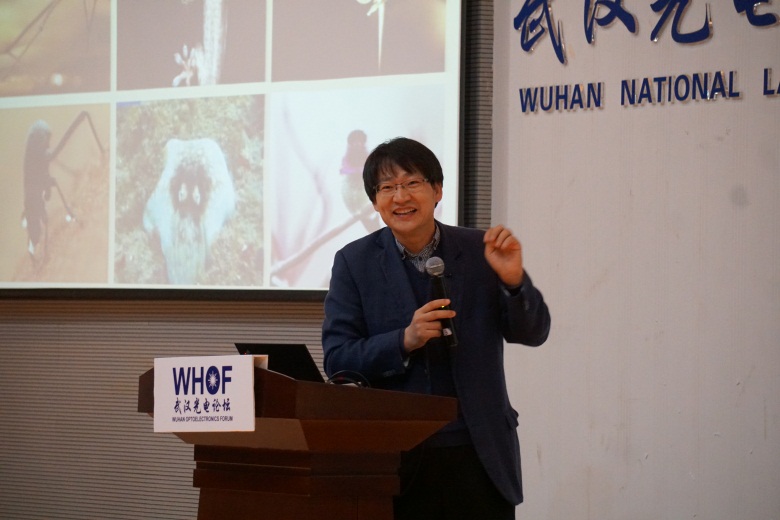WUHAN, China (December 10, 2018) - Wuhan Optoelectronics Forum No. 149 was successfully held in Auditorium A101 at Wuhan National Laboratory for Optoelectronics (WNLO) in the morning of December 10. Prof. Zuankai Wang from City University of Hong Kong delivered an exciting talk entitled Nature-inspired Innovation. Dr. Bin Hu, from WNLO chaired the forum. Prof. Jun Zhou, Deputy Director of WNLO, awarded Prof. Zuankai Wang the forum medal.
Materials assembly and integration at multiple length scales are critical to the functioning of new generation solar energy devices, and call for basic science informed design and elaboration. The key is to understand and leverage the intrinsic properties of the tailored materials as well as the interplay between the material components so as to realize the desired functions. In this contribution, I will present some of our recent results in interfacing and assembling various nanostructures by solution processes. The novel materials have been explored as efficient light absorbers, carrier transporters, interlayers and surface reaction promoters for high-performance solar energy conversion devices, particularly perovskite solar cells and photoelectrochemical cells. Implications of these results on the future development of new solar energy devices will be discussed. The progress of humankind has been marked by five main waves of innovation. Each wave has transformed our industries and societies, yet is also coupled with the consumption of resources, pollution, and energy/water shortage. In contrast, honed by billion years’ evolution, nature has developed extraordinary principles which are characterized with green energy and resilience. This talk focuses on how nature-inspired innovation will address the grand challenges facing us such as water, energy and health engineering.
Dr. Zuankai Wang is currently a professor in the Department of Mechanical Engineering at the City University of Hong Kong, and one of the founding members of Young Academy of Science of Hong Kong. He earned his B.S. degree in Mechanical Engineering from Jilin University in 2000 and Master degree in Microelectronics from Shanghai Institute of Microsystem and Information Technology, Chinese Academy of Sciences, in 2003, and Ph. D. degree in Mechanical Engineering at Rensselaer Polytechnic Institute in 2008. After one year postdoc training in Biomedical Engineering at Columbia University, he joined in the City University of Hong Kong in September 2009 as an assistant professor. Over the past four years, his research group has published 9 papers in Nature/Science Series Journals. His work has been included in the Guinness Book of World Records, and highlighted in Nature, Nature Physics and many other media coverages. Prof. Wang has received many awards including the 35th World Cultural Council Special Recognition Award (2018), President’s Lectureship at City University of Hong Kong (2018, the first professor to deliver this lecture), Outstanding Research Award (2017, the first associate professor to win this award) and President’s Award at the City University of Hong Kong (2017, 2016), Changjiang Chair Professor by Ministry of Education of China (2016). Outstanding Youth Award conferred by the International Society of Bionic Engineering (2016), OSA Young Scientist Award (2016). The Ph.D. students he supervised have won a number of prestigious awards including Young 1000 Talent Plan (2017, two PHD graduates), MRS Graduate Student Gold Award (2016 Fall Meeting), Hiwin Doctoral Dissertation Award (2016), Hong Kong Young Scientist Award (2015), and MRS Graduate Student Silver Award (2015 Spring Meeting)

